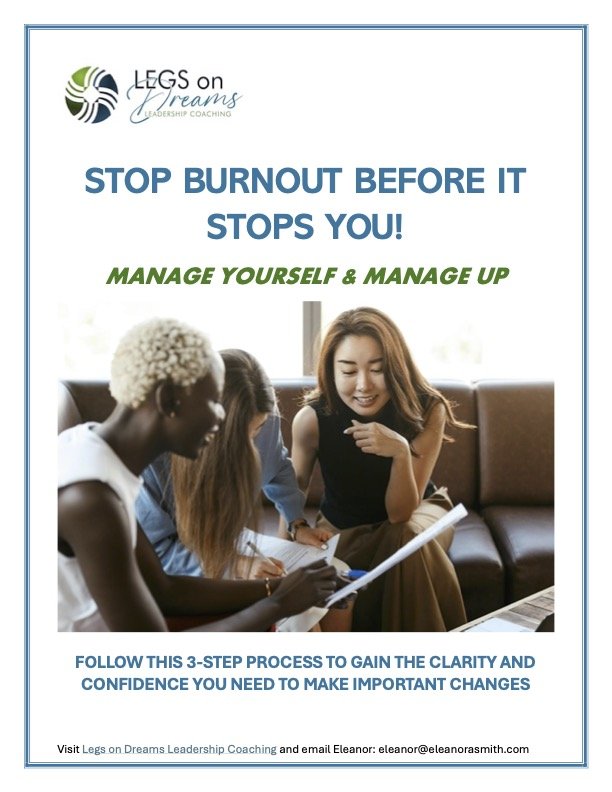
Supporting mission-driven leaders who want to go from surviving to thriving at work
Achieve career goals and overcome obstacles with joy & without burnout

You’re committed to building a better world. You deserve to enjoy your work.
Skip the Sunday Scaries and stop dreading Mondays.
You’re hustling more than ever, and the grind is getting to you.
You sense it may be time for a change, but you don’t see any good options.
I’m Eleanor Smith (she/her), Somatic Leadership Coach
I partner with foundation, nonprofit and other mission-driven leaders to clarify priorities, remove obstacles and build confidence to fulfill career dreams.
I’ve been in your shoes. For the past 30 years, I’ve worked with numerous philanthropic and nonprofit organizations to help them meet their missions.
I’ll support you in envisioning the future you want and guide you to the tools you need to make it happen!
Stop Burnout Before It Stops You!

Feeling overwhelmed? There is hope! You don’t need to work till you drop — and you don’t need to quit your job.
Follow these simple steps to identify the cause of your chronic stress and take action to reverse your course — before it’s too late..
By submitting this form, you agree to receive occasional emails from Legs on Dreams Coaching.

“When I first stepped into my role, I had little managerial experience. For nearly two years, Eleanor offered a safe space and practical tools to navigate challenges and build self-confidence.
I'm now able to trust and support my team, keep myself grounded, and make tough decisions with compassion and assurance.
Eleanor’s coaching has been invaluable to my growth as a leader.”
Sonia Sifuentes, Program Director/Interim Executive Director, Bay Area Cancer Connections
As you no doubt have experienced, boundary trespassers show up at work in a variety of guises.
One of my clients had a boss who frequently added new tasks to her already overfull job; she seriously considered quitting due to the growing stress from overwork;
Another client’s boss asked her to schedule meetings and perform other administrative tasks, even though she had been promoted to program director;
A third client was frustrated with a new staffer who regularly interrupted her while she worked in her office with the door closed.
Leadership presence is usually described as confidence or charisma, but its real power comes from presence itself. When leaders can stay attentive and grounded, they think more clearly, listen better, and build trust that people feel immediately.
My sister died recently. She’d lived alone after her husband passed away and suffered from numerous serious medical conditions. Living alone was precarious.
I asked a nurse from the local hospital and my sister’s long-time friend to help me hire a housekeepers and a caregiver to assist her. But my sister was fiercely independent and fired every one. Over time her health sharply declined, as did the state of her house.
Photo: RDNE, Pexels
How do we find the strength to keep going despite enormous pressure to give up?
When doors keep slamming shut in front of us, how can we wait till a new one opens?
It can seem we’re constantly in flux as our job roles shift, coworkers depart, new people join the team, new tech tools change how we work, and we choose to move to a new job, retire, or start a consultancy.
Ever needed a swift dose of confidence just before an important presentation or a high stakes conversation?
Skip the whiskey shot and try this simple trick to get a surge of assurance from your body’s own neurochemicals.
Photo: aranprime-qg9RJasjQ6c, Unsplash
A coaching client facing a big transition felt anxious about her future. Unable to see herself in a new context, she feared losing the familiarity, identity and structure of her current situation. I invited her to picture herself gaining experience she wanted and enjoying new friends and new places
In a prior post, I shared a story of a client who used her “embodied self-awareness” to change her behavior in ways deeply aligned with her long-term career goals.
Now I’ll talk about what’s meant by this term, how it differs from the more familiar "conceptual self-awareness" and, most important,
Photo: Anete Lusina, Pexels
I’ve been working with a foundation leader for a few months. She started at the foundation 13 years ago and worked her way up to senior leadership.
She’s in a newly created position that at first felt a bit ambiguous. We have worked on ways to think and talk about her new role, gain greater clarity from her boss
Photo: Cdoncel, Unsplash
Ever pondered how someone you disagree with strongly came to their beliefs?
Are you baffled by the way people on the same team can view a work situation through many different lenses?
Do you ever wonder why some of your direct reports breeze through their tasks, asking questions to guide them, while others often miss deadlines, but hesitate to ask for help?
If yes, what steps have you taken to understand what’s
Photo: Cottonbro, Pexels
Do you beat yourself up for interrupting people? Perhaps you want to stop being late or curb your tendency to offer unsolicited advice. Maybe there’s another “bad habit” you’d like to change.
The following 3-step process can help you shift a habit, quiet your inner critic and boost your empathy muscle.
Photo: Ketut Subiyanto, Pexels
Do you have trouble making personal or career decisions? It’s easy to confuse the “urgent” with the “important” or choose an option that feels easy instead of the one that’s best. Many of us also tend to say “yes” in the moment, later regretting that answer.
Photo: Emmy E, Pexels
You probably know a development professional who chose to leave their job due to burnout. Perhaps you are such a person. I certainly am.
My first job as a development director (DD) was at a small nonprofit with a mission I loved. The group had an annual fund fed by very low “membership fees”. Each year, members were sent a beautiful glossy calendar created through a photo contest the DD managed. Despite its member focus
Photo: Andrea Piacquadio. Pexels
I’ve been sleeping more lately. I’m also learning a lot in an intensive and fascinating somatic coaching course. More on the course later.
As I recover from a cold on the cusp of an overseas vacation, I’m practicing “exquisite self-care” so I can enjoy my trip.
Photo: Kaboompics.com, Pexels
This is what a wise friend of mine told me yesterday when I said I was calling my Congressional representatives to register my opposition to the new administration's war on everything I hold dear.
I'm departing this post from my usual focus on workplace wellbeing. Instead, I'll speak about my own mental health and responses to what's happening on the national scene.
I'd love to know how YOU are faring in the face of all the chaos and damage to our sector and the whole country. I hope you're taking good care and hanging in there.
Photo: Eleanor Smith
Spoiler Alert: I hope I’m not giving away too much when I say the AppleTV+ hit thriller Severance is science fiction. Some of us may wish we could keep our work and personal lives totally separate. But it’s not possible.
Photo: RDNE, Pexels
Do you find yourself saying yes to every request from your boss or coworkers? Do you work nights and weekends to get the work done?
I used to overwork a lot. I thought that taking on more and more responsibilities would prove that I was competent, dedicated and worthy of a promotion, a raise or just my current job. It wasn’t until I hit a wall hard that I realized I was no longer able to keep up that exhausting pace.
Photo: Thirdman, Pexels
For nearly a year, I’ve been coaching a nonprofit leader since her second month in a small direct services organization.
She was hired to lead an important department; it was the first time she’d supervised others.
Photo: Vuralyava, Pexels
I started an intentional gratitude practice about 15 years ago. I asked a friend if she’d like to be my “gratitude partner."
We began daily email exchanges to the other, simply listing all the people, events and things in our lives that we felt grateful for that day.
Photo: 2mephoto, Pexels
If you’re like me, you felt despair last week and more than a bit baffled how the election could have turned out the way it did. I know I traveled a long distance through a thicket of emotions.
Image: Cottonbro, Pexels
A student in my Nonprofit Management Certificate Course last semester asked, “Why are nonprofit workers paid so poorly?”
A clinical psychologist, she founded a nonprofit to provide subsidized therapy to low-income clients. In a discussion on nonprofit leadership, she said she’d
Photo: Nordic Overdrive, Pexels
I recently led a half-day workshop on staying well at work for 60 staff members of three nonprofits serving people affected by sexual assault, domestic violence and homelessness.
Photo: Fauxels, Pexels
Like you, I’ve been busy the last few weeks. Sitting down to share my thoughts about leadership, organization culture and workplace wellbeing has been challenging. More soon on what I’ve been up to—all good!
After listening to a recent podcast, I decided I just had to share it.
Photo: Pixabay, Pexels
After college, I worked as an entry-level staffer in a small nonprofit founded and led by an imposing, outspoken man decades older than me.
One day he came into the department where I worked to propose a sweeping change that would double our team's workload without adding new staff.
My co-workers agreed with me that the idea was terrible, but the head of our department wasn’t willing to challenge the boss.
Photo: Vitaly Gariev, Pexels
Last post, I shared several ways nonprofit executives can take good care of themselves and keep burnout at bay.
This post I'll talk about how to build and maintain a positive, healthy culture at work so staff feel supported to do their best work and stick around.
An organization's culture is not the list of values on the website, nor the mission.
Photo: Alexander Suhorucov, Pexels
I just heard about the CEO of a small nonprofit who took a month off recently due to burnout. She'd been hospitalized before because of work stress.
Back at work and starting to feel overwhelmed again, she doesn’t see a way out and seems ready to, once again, sacrifice her health for “the cause.”
Photo: Vlada Karpovich, Pexels
I wrote last time about how burnout – and burnout denial -- are rampant in our sector.
A new book offers hope to prevent everyday stress from burning us out.
First, let’s be clear what "burnout denial" means. Burnout denial is the tendency we have to ignore, minimize, rationalize or otherwise deny that our bodies and minds are hurting from chronic work stress.
Photo: Kampus Production, Pexels
I recently lost a good friend. Privileged on several fronts and super-smart, she had meaningful work, close friendships and warm collegial relationships.
But, like many of us, she risked her health by not managing chronic stress symptoms – which the doctors said contributed to her death.
Photo: Cottonbro Studio, Pexels
Among the reasons people come to me for coaching is to gain clarity before making a high-stakes decision.
Some need to figure out their next career move, when to leave a job, the best time to retire or whether and how to start a consulting practice.






























